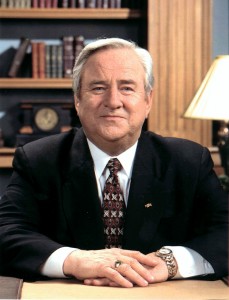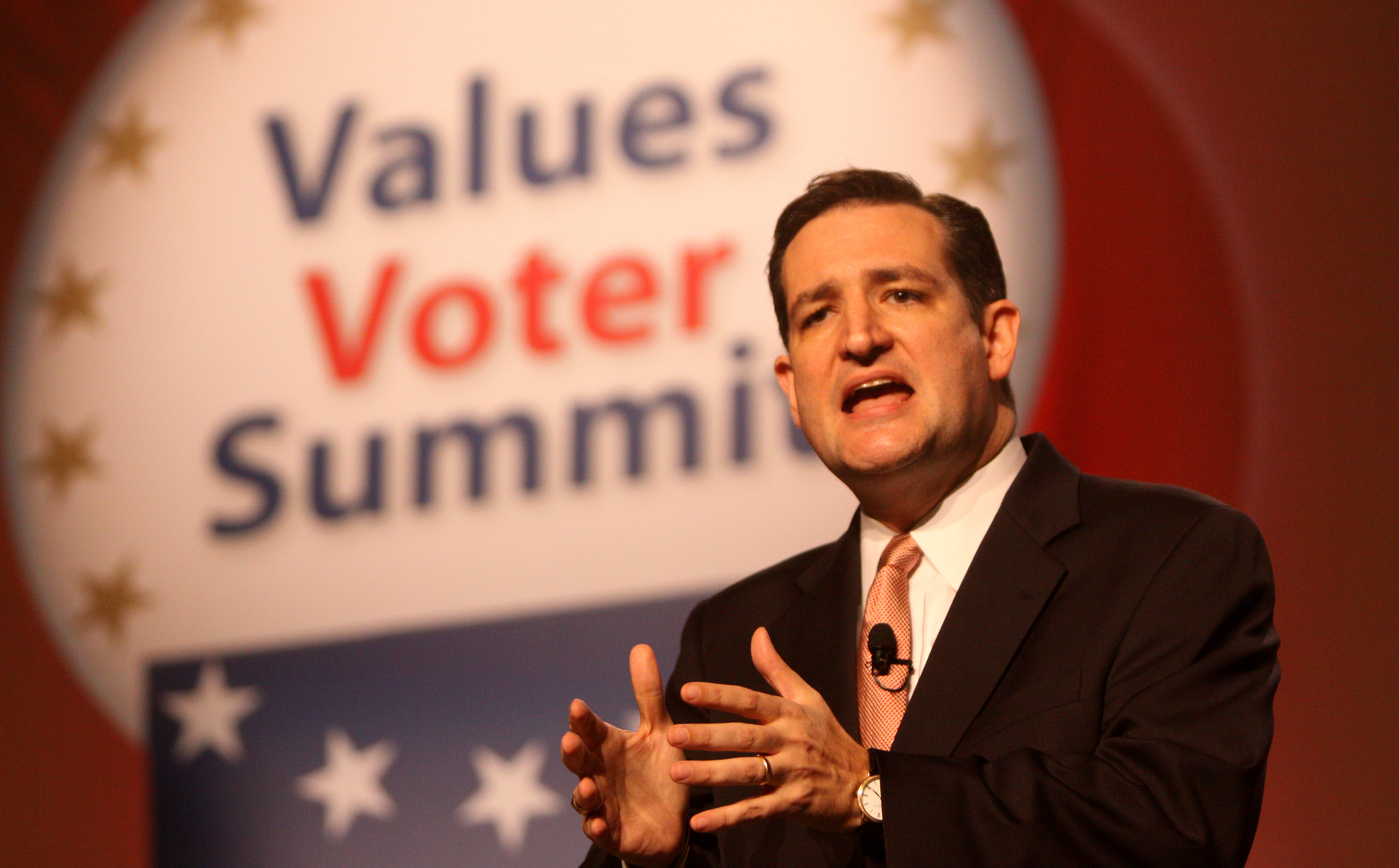Senator Ted Cruz, famous for his far right ideology and disinterest in compromise, became, with a speech in a packed auditorium at Liberty University, the first Republican to officially announce his presidential campaign. The school in Lynchburg, Virginia has long championed the causes of the evangelical right. In fact, the school’s resolve to uphold free market principles as well as fundamentalist Christian values is enshrined in its mission statement, which, in its opening line, explicitly supports creationism. Although it makes sense for a candidate like Cruz to announce his candidacy at Liberty, a gesture obviously aimed at the GOP base, the history of the school sends a particularly extreme and perhaps antiquated message to voters that may be even too radical for the Republican primaries, where voters chose electability over ideological purity in both 2008 and 2012.
Liberty was founded by Jerry Falwell, an evangelical preacher from Lynchburg, Virginia. Falwell got his start preaching on Christian radio, eventually gaining enough of a following to establish the university and to create the Moral Majority, a conservative Christian political organization with considerable influence in the Reagan administration. The Moral Majority lobbied members of Congress throughout the 1980s to reject the social reform of the sixties and seventies in favor of ardent support for “traditional” family values. They championed repealing Roe v. Wade, protecting prayer in public schools and opposing the Equal Rights Amendment. During the HIV/AIDS crisis, they similarly threw their weight, and consequently that of the Christian right, behind blocking significant funding for AIDS research. Falwell himself called AIDS, “not just God’s punishment for homosexuals,” but also punishment for “a society that tolerates homosexuals.” He blamed 9/11 partially on gays and lesbians and feared that the “homosexual steamroller” would destroy decent people everywhere.
The colorful history of the university and its founder conflicts, however, with prevailing attitudes of American voters and thus proves confusing for a candidate with any interest in winning a general election. In Virginia, where Liberty is located, same-sex marriage is legal and 56 percent of the population is in favor. Nationally, same-sex marriage is even more popular, with 63 percent support. Obviously, support among Republicans for LGBTQ rights is much lower, but even nearly half of evangelical millennials support same-sex marriage. So it seems counterintuitive for someone running for president, even in a Republican primary, to wholeheartedly embrace the philosophy of an institution so at odds with popular sentiment.
The complicated truth for Republicans is that their evangelical base is making it impossible for them to win national elections.
The evangelical wing of the Republican Party has been a potent political force for decades, but, now, it’s not clear if its considerable influence can lead to electoral success. Republicans seem to think it can. Increasing turnout among evangelical and anti-establishment voters by posturing as the most ideologically pure far right candidate is Cruz’s basic strategy. To accomplish this goal, he’ll need to eliminate ideologically similar candidates like Mike Huckabee and Ben Carson early in the primary season. The Republican establishment, despite continued calls to widen the party’s appeal, is entertaining this strategy as well. Establishment favorites like John McCain and Mitt Romney have both given speeches at Liberty. As of late, however, it seems that appealing to the evangelical base of the GOP does nothing but thwart Republican presidential aspirations. Carson, a former Johns Hopkins neurosurgeon, recently called homosexuality a choice, claiming that plenty of men “turn gay” in prison. Almost immediately, he was forced to backtrack by a media and a public no longer inclined to entertain such offensive rhetoric. Mike Huckabee, during an interview on Real Time with Bill Maher, claimed that Christians are under attack and are belittled by the media, a point that Maher immediately refuted and ridiculed. Huckabee did not even try to argue.

Even more recently, an Indiana bill meant to protect religious freedom has caused a political and commercial uproar, because the law may in fact be a tool for discrimination against LGBTQ individuals. Private enterprises like Angie’s List, Apple, the NCAA and the NBA have all come out resolutely against the bill. The CEO of Angie’s List even announced that the company would cancel a planned expansion into the state that would’ve created a thousand jobs. As a result, Republican governor Mike Pence has been rushing to undue the damage, to little avail. Sunday on Face the Nation, he wouldn’t answer whether the bill would allow florists, for example, to refuse service to gay couples and claimed that “tolerance is a two way street,” implying that the media and businesses should tolerate state sanctioned “religious” discrimination. Meanwhile, during panels on both Meet the Press and This Week, the bill had no defenders, even among Republicans. Although conservatives in Indiana may support the bill, catering to this radical base has created a public relations and economic nightmare. #BoycottIndiana has been trending on Twitter and some prominent pundits have even called to pull Indianapolis from the Final Four.
The danger of the power of the far-right was evident in both Mitt Romney’s and John McCain’s campaigns. Both candidates postured themselves too far to the right in the nomination battle, alienating moderates and losing the general election as a result. John McCain nominated Sarah Palin to appease evangelicals and was then forced to a deal with an unpredictable and uneducated running mate who continually embarrassed him. Mitt Romney did the same by flip-flopping on almost every social position he held as governor of Massachusetts, only furthering the view that he had no legitimate beliefs. The complicated truth for Republicans is that their evangelical base is making it impossible for them to win national elections. As the public’s views on social issues continue to liberalize, the GOP will either have to abandon their solid evangelical voting bloc or continue to lose the moderate vote, and therefore lose the White House. George W. Bush and Reagan were able to capitalize on born-again Christian support because it resonated with more Americans. Now, however, modern versions of Jerry Falwell cannot have the kind of influence they had previously because most of the public disagrees with them. In short, if Republicans want the White House in 2016, they should avoid Liberty University.
